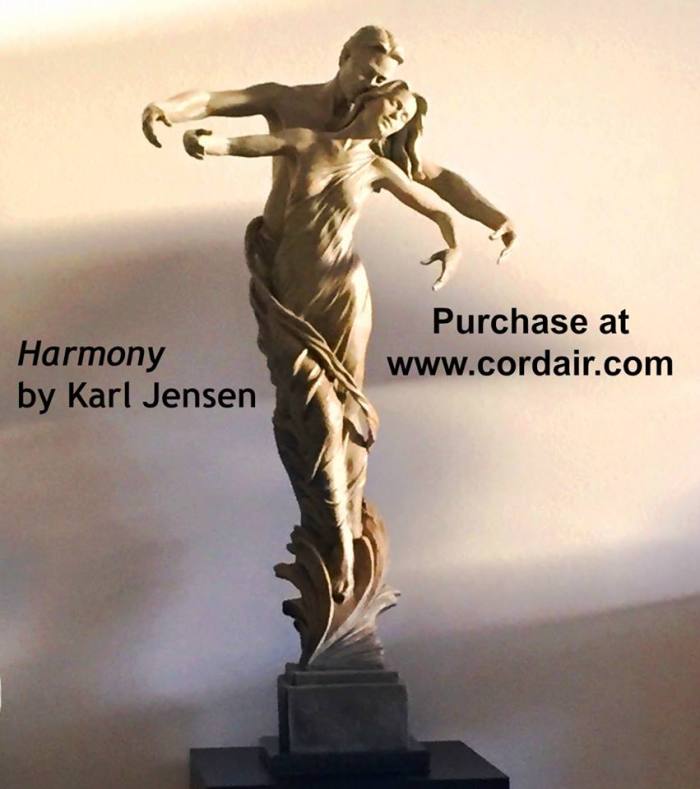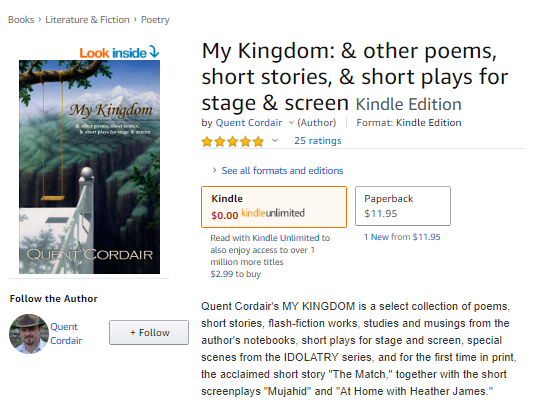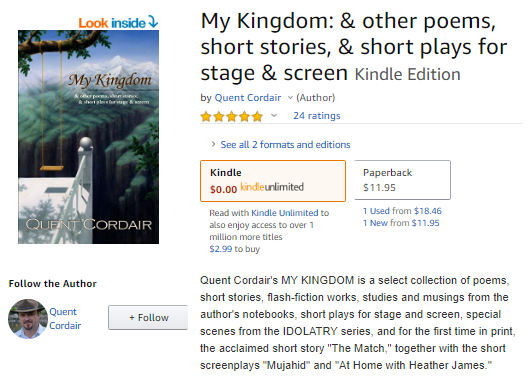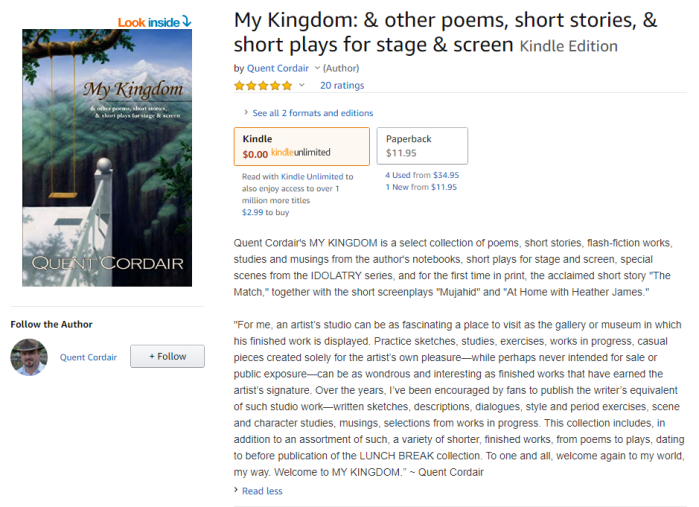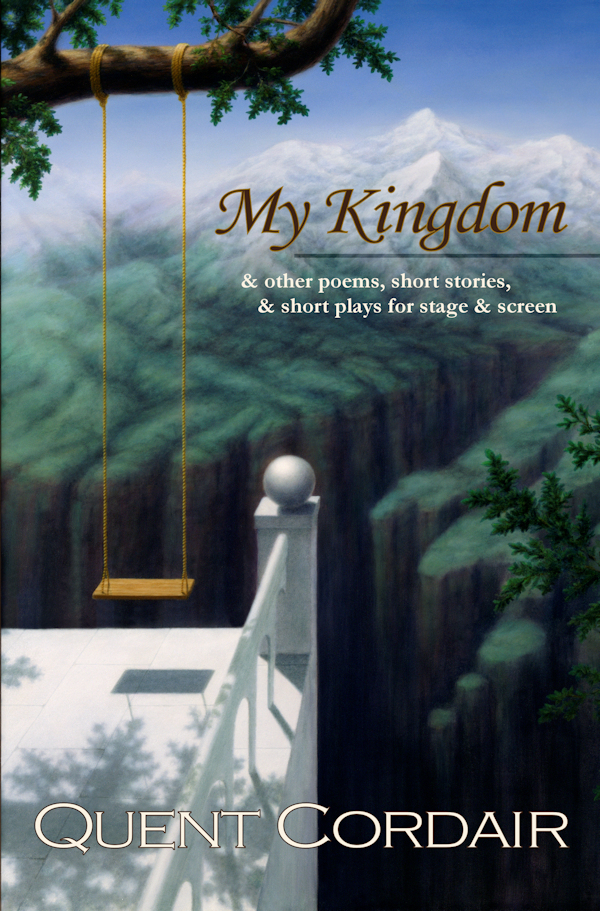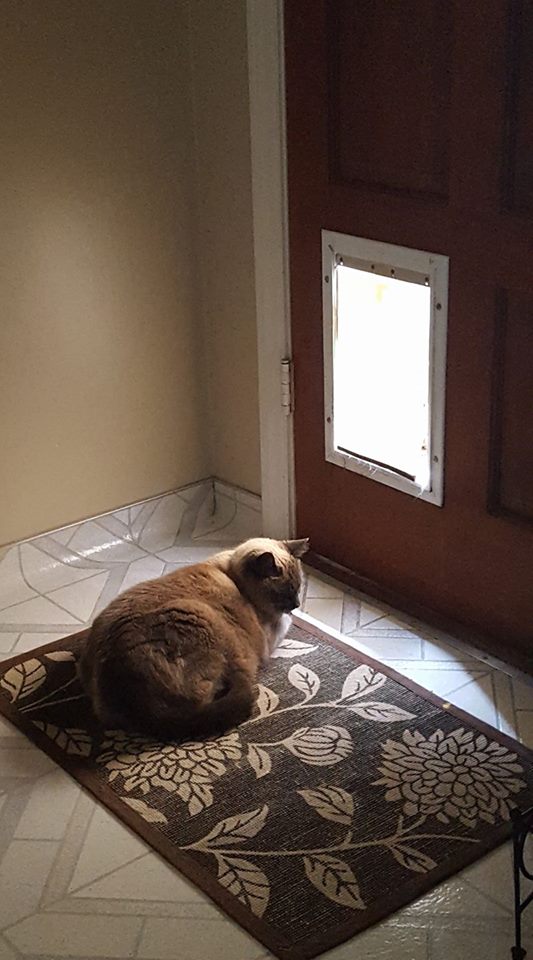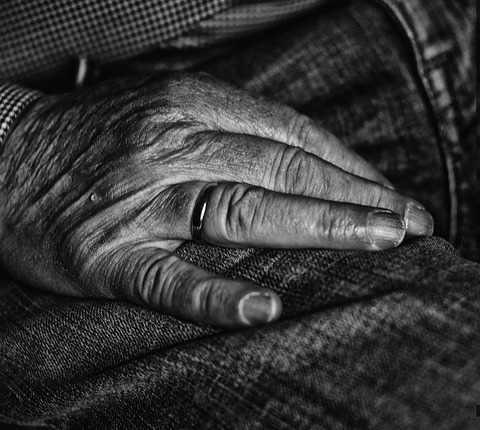The Sculpture That Won the War
by Quent Cordair
From a letter to a sculptor
Sept 27, 2001
From the Lunch Break collection
ONCE UPON A TIME, there was a sculptor who had only the face to finish of a magnificent statue, his masterpiece to date. Frustrated by his limitations and increasingly dissatisfied with his efforts to bring into existence the perfection in his mind’s eye, his progress on the artwork had foundered and stalled. His workshop had fallen silent. Indeed, as the days and weeks and months drifted on, the statue was in danger of never being finished at all.
But on a crystal-clear morning, a morning seemingly as peaceful as any other in living memory, a shocking event occurred: the sculptor’s country came under attack. It was a morning of sudden and unexpected terror, of cold-blooded murder that left thousands dead and the populace reeling.
Over the next days and weeks, a miasma of insecurity and anxiety settled over the land, ubiquitous and inescapable, visible on the faces of the rich and the poor, the young and the old, the strong and the weak, the eminent and the obscure. Their sense of wellbeing had vanished overnight; their paradigm had shifted, ostensibly forever. In response to the attack, some wanted to stand and fight; others wanted to kneel and plead; most wandered through their hours fearful and confused, unsure of what to do. While the government drafted plans for war, the citizenry went about their daily routines as well as they were able, anxious for what the fractured future might bring for themselves and for their loved ones, wanting to do something, anything, to combat the pervasive sense of helplessness, yet uncertain of what, if anything, could be done.
The sculptor knew that his country was in greater need than ever of emotional fuel, and he knew what could help provide it. His country was fighting for her life—she needed vision and inspiration to survive, to defend herself, to remember what she had once been, to conquer, to rebuild, to thrive once again. With renewed vigor and determination, he threw his efforts into doing what he could do, contributing with what he did best. Days and nights, coffee and curses, dejection and perseverance, but finally—satisfaction, satisfaction that he had done what he could do, as well as he could do it.
Within a few weeks of the enemy’s strike, the sculptor sent his finished clay to the foundry; within a dozen weeks thereafter, the foundry delivered the finished bronze to the gallery; the gallery, in turn, delivered the artwork to the client who had commissioned it.
The delivery brought in the balance of payment to the gallery which, due to the widespread economic uncertainties subsequent to the attack, was on the brink of closing for lack of sales. The buyer, upon receiving the sculpture, was so delighted with the finished work that he was motivated to place yet another significant commission with the gallery, and the deposit toward the new commission kept the gallery open for a few precious months more. Over that period, the economy stabilized sufficiently that regular purchases began to trickle in again, just enough that the gallery would never again be quite so close to failing.
In the spring after the sculpture was completed and delivered, an eight-year old girl was passing by the gallery with two of her friends. Upon catching a glimpse of the art on display in the window she drew her friends inside, and as they browsed the cornucopia of treasures within, the girl stopped before a lovely figure, a bronze sculpture patined in white. It was a smaller casting of the sculptor’s larger masterpiece. She fell in love with it, and she was all the more enchanted and delighted when she discovered, upon reading the tag at the artwork’s base, that she shared the sculpture’s name. She could hardly afford the sculpture itself, of course, but she spotted a photographed image of the piece framed and hanging on the wall nearby. It too was available for purchase. She checked the price—she couldn’t afford the photograph either. But she did have five dollars. She approached the gallery manager to offer what she had, wondering, hoping. The manager dug through her filing cabinet and found, from a recent mailing campaign, a postcard that featured an image of the sculpture. She gave it to the girl, smilingly, without charge. The girl went home and slipped the postcard into the edge of the mirror on her bedroom wall.
* * *
A young pilot cruised silently through the cold night sky, the diamond dust of stars twinkling above. The blanket of clouds below stretched ahead toward a rumpling rise in the distance, marking the boundary of mountainous terrain beneath. His sortie consisted only of himself and his wingman, in two stealth fighters. According to the screen in front of him, they had just crossed the border into enemy territory. It wouldn’t be long now.
The mountains ahead bristled with anti-aircraft batteries.
War had been declared on those who had supported the terrorists and their atrocious acts. The ground war was proving more difficult than anticipated, with the enemy forces scurrying back into the crevices and caves of the mountains at the slightest provocation. The enemy’s military leader, the very swine who had devised and overseen the terrorist attack, was proving elusive, but a disillusioned member of his inner circle had been susceptible to bribing, and the leader’s location had been leaked. The caves in which he was thought to be hiding and their surroundings had been bombed incessantly over the past days, and on this evening, an intelligence satellite had picked up a small convoy attempting to leave the area under the cover of darkness. A forward spotter on the ground confirmed that it was indeed the enemy leader, who could disappear into another system of caves within minutes or hours.
The jets had been scrambled immediately, and now the pair were within a short thirty miles of their target. They rolled onto their sides and slipped like diving nighthawks through the clouds and to the height of the peaks before turning into a craggy-walled valley. By design, the cutting-edge craft were nearly undetectable by radar, but a watchful enemy soldier, at first spooked by the two shadows streaking silently above, frantically radioed ahead a warning. Anti-aircraft fire began tracing upwards, trying to catch the fleeting apparitions. The pilots dropped lower so as not to offer a silhouette against the night sky. Without warning, a missile from below caught the wingman’s craft, and it erupted into a comet of flame, dropping away without so much as a sound from the pilot’s radio.
The young pilot who remained fought to stay focused. All of his reflexes wanted to pull the stick back and shoot straight up to the sky, to rise above the fiery tracings that would surely find him too at any moment, to live to fight another day.
Deep in the canyon, radio reception was intermittent and broken. He might have heard his commander’s order to pull up and out, but he might not have heard it either. If he climbed, he might be able get a fair shot at the convoy from altitude—if he survived the incoming fire to which the altitude would expose him—but it was the enemy leader himself, the black heart and soul of the enemy forces, who was traveling in that convoy. When would there be another chance if the pilot missed or if he were shot down before being able to make another attempt? How long might the war drag on if the leader escaped? The images that had been seared into his memory on that accursed morning came again—the hijacked airliners crashing into the skyscrapers, the innocents plunging from the heights to their deaths, the buildings collapsing, the vacant despair on the faces of the survivors.
He thought of the postcard in the breast pocket of his flight suit, of the delicately looped handwriting in violet pen on the postcard’s reverse, of the girl who had sent the accompanying letter. He switched off his radio. Steeling himself, he kicked the plane over on its side, banking hard around a canyon corner, flying lower yet, the bullets from small arms pinging into his craft’s underbelly.
The infrared radar confirmed the vehicles of the convoy on the road ahead, speeding toward a pass so narrow that even if he were on his side he wouldn’t be able to follow them in. He dropped lower, the dust from the road boiling in his wake. Either of the laser-guided bombs on board would get the job done, but he wouldn’t be able to gain enough elevation in time to guide one in on the first pass, and he wouldn’t be able to complete a second pass before the convoy scattered.
He hadn’t even met the girl. She was a student in a class of fourth graders that had adopted his unit. They had sent a package of homemade baked goods and letters. Her envelope had found its way onto his bunk just the evening before. The letter opened with the generically respectful “Dear Sir—” He recalled the words written on the back of the enclosed postcard and the tiny violet heart after the girl’s name. On the front of the postcard was the image of a sculpture, the embodiment of innocence and delight. It was the only mail he had received in weeks. It was enough.
“Okay, baby, this one’s for you. . . .”
He armed both of the bombs and aimed the nose of his black angel at the rear vehicle in the convoy ahead. In his final seconds, he thought of the target, of the enemy leader, and realizing something, he chuckled. With the fire of hell in his eyes, he said, “Live by the plane, die by the plane, mother f—”
* * *
On a cloudless morning in the thin mountain air, an American soldier walked through the scattered wreckage at the site of the strike. Pieces of wood, metal and clothing were scattered about the perimeter of the blackened gouge in the road, three hundred yards long. It would go down in history as the place where the head of the hydra was killed and the tide of war had been turned. The platoon was combing through the wreckage for any of what might remain of the leader’s papers and effects. Of the pilot’s body, they hadn’t been able to find anything, though small pieces of the plane were identifiable here and there. But the oddest scraps can survive such conflagrations: after the attack that had brought down the buildings and started the war, one of the terrorists’ passports had been found in the rubble below.
The soldier lifted a piece of twisted metal and noticed in the ashes beneath it a postcard, its edges curled and seared brown but otherwise unburned. On the front was the photo of a sculpture, an elegant figure in white, beckoning to be followed into a world of wonder and happiness. The soldier smiled. He turned the photo over and read: “Dear Sir, this is how I used to feel before the war. I hope I can feel this way again someday. Thank you for fighting for me. — Joy”
The soldier tucked the photo into his breast pocket and slung his rifle over his shoulder. Kicking aside a half-burned turban, he walked down the road and took in a chestful of clean air. For the first time in months, he allowed himself to think of home.
* * *
*
Copyright 2001, 2012, Quent Cordair. All rights reserved.
The Sculpture That Won the War is included in the Lunch Break collection of short stories and poems by Quent Cordair ~
collection of short stories and poems by Quent Cordair ~
In Lunch Break, adventure, suspense and romance rule the day as the protagonists pursue their ends with passion and perseverance. The collection includes stories originally published in *The Atlantean Press Review* and *ART Ideas.*
A billionaire struggling for hope searches the world for love…. A country girl with a rifle stands ready to deliver justice…. A former banker washes windows on the side of a skyscraper…. The daughter of a foreign official is lured into the heart of San Francisco…. The son of a wealthy divorcee helps recover her lost soul…. In the aftermath of a terrorist attack, a sculptor’s work inspires and uplifts…. A teacher pursues an elusive assassin…. A family man follows his own course in preparation for apocalypse….
“…well worth the price. If you haven’t read any of Quent’s stories yet, I almost envy you. I’m waiting eagerly for more.” – Dianne Durante, author of the *Forgotten Delights* series
“Could you read these during your lunch break? Yes. Will you want to? No. You won’t want to rush yourself. You’ll want to pour yourself a glass of wine, snuggle into your favorite chair, turn off your phone, and spend every luxurious minute that you can immersing yourself in these stories.” – Elizabeth O’Brien, author of *English Grammar Revolution*
“…it is fuel for the spirit; it is an affirmation of life and what is good. That he writes beautifully and imaginatively adds to the reading pleasure.” – Michael Wilkinson, Sculptor
Enjoy your own Lunch Break today!
***
*
Don’t miss GENESIS, Part I of IDOLATRY . “Beautifully written, on the order of Ken Follet’s Pillars of the Earth, with the historical insight of James Michener, it brings to life a time of great thought, great art, and its clash with religious fanaticism. Cordair writes with a poet’s sense of scene and nuance and gives us a great deal of insight into the mind of a sculptor.” 5-STARS — Alan Nitikman

In the twilight of the Roman Empire, a sculptor struggles to keep an 800-year dream alive while honoring the love of his life and raising his adoptive son. Part I of the *Idolatry* series, an epic story in five parts. Now available for Kindle, in paperback and on audiobook…
“It is extremely difficult to believe that this is a novella when you finish it. You feel like you’ve followed the entire burning course of an epic romance, the life of a young bright mind carelessly following a difficult road, and a dramatic plot against anything glorious. Cordair had a way of bringing tears to my eyes in his previously published short stories. He has a way of creating scenes of emotional wonder and then forcing you to linger on the emotion in sorrow or defiance or happiness. … Cordair leaves us with the feeling that any obstacle, any voice that says with any amount of force that we can’t be exactly what we want and know we ought to be, is too small to care about – and the consequences of ignoring such a voice can never be so bad.… Cordair’s craft is a triumphant inspiration, the kind a soul can yearn for more of in whatever part of the tale comes next.” 5 STARS — Joseph Hampel
Genesis is now available for Kindle, in paperback, and on audiobook on Amazon here…


